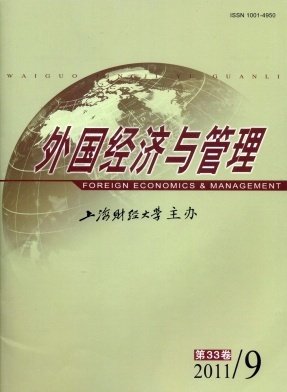泰罗科学管理的遗产及其反思——兼纪念《科学管理原理》诞生100周年
外国经济与管理 2011 年 第 33 卷第 09 期, 页码:1 - 10
摘要
参考文献
摘要
100年前,泰罗的科学管理理论就开始给人以振聋发聩的思想冲击,旗帜鲜明地传播着种种关于管理学历史、现实和未来的学术思想和经典命题;今天从管理思想史的视角盘点泰罗的科学管理留下的遗产,是为了梳理我们的理路和进行深刻的反思,以使我们超越不同视域的限制,并向纵深发掘科学管理留给我们的遗产。本文首先从科学管理理论对于管理学作为一门独立学科发展的重要意义、人类历史上第一次把知识系统地运用于生产与工艺管理的深远意义、"管理就是效率"这个最经典的管理学命题、泰罗提出的"人事管理"对于推动人力资源管理实践和理论研究的意义、泰罗开创的管理学科学研究与调查方法等五个方面论述了泰罗的科学管理理论给我们留下的精神遗产,然后从科学管理理论的确定性与时间可逆性、对人的研究的忽视以及分解还原式研究方法三个方面对泰罗的科学管理理论进行了评判和反思。
[1]Stewart,Thomas A.Intelligent capital:The new wealth of organizations[M].London:Nicholas Brealey,1997.
[2]Drucker,Peter F.Managing for the future:The 1990s and beyond[M].New York:Dutton,1992.
[3]Drucker,Peter F.The new productivity challenge[J].Harvard Business Review,1991,69(11/12):69-79.
[4]Sheldarke,John.Management theory:From Taylorism to Japanization[M].Boston,Massachusetts:International ThomasonBusiness Press,1996.
[5]Bartlett,Christopher A,and Ghoshal,Sumantra.The individualized corporation[M].Boston,Massachusetts:Harvard Busi-ness School Press,1997.
[6]Hamel,Gary.Revolution vs.evolution:You need both[J].Harvard Business Review,2001,79(5):150-153.
[7]周建.泰罗科学管理的范式观及其思想价值[J].科学学研究,2002,(10):510-516.
[8]Drucker,Peter F.Management challenges for the 21st century[M].New York:Harper Press,1999:139.
[9]Weisbord,Marvin R.Productive workplaces:Organizing and managing for dignity,meaning and community[M].San Francis-co,California:Jossey-Bass,1991.
[10]Lengnick-Hall,Mark,Lengnick-Hall,C A,and Drake,B.Strategic human resource management:The evolution of the field[J].Human Resource Management Review,2009,19(2):64-85.
[11]Lawler III,Edward E.The ultimate advantage:Creating the high-involvement organization[M].San Francisco,California:Jossey-Bass,1992.
[12]Pfeffer,Jeffrey P.Competitive advantage through people:Unleashing the power of the work force[M].Boston,Massachu-setts:Harvard Business School Press,1994.
[13]Guillén,Mauro F.Scientific management’s lost esthetic:Architecture,organization,and the taylorized beauty of the mechani-cal[J].Administrative Science Quarterly,1997,42(4):682-715.
[14]弗雷德里克.泰罗.科学管理原理[M].北京:中国社会科学出版社,1984:221.
[15]Doll,William,E,Jr.A post-modern perspective on curriculum[M].New York:Teachers College Press,1993:2.
[16]Duck,Steve.Meaningful relationships:Talking,sense,and relating[M].Thousand Oaks,California:Sage,1994.
[17]Gefen,D,and Ridings,C.Implementation team responsiveness and user evaluation of CRM:A quasi-experimental designstudy of social exchange theory[J].Journal of Management Information Systems,2002,19(1):47-69.
[18]Mintzberg,H.Organization design:Fashion or fit?[J].Harvard Business Review,1981,59(1/2):103-116.
[2]Drucker,Peter F.Managing for the future:The 1990s and beyond[M].New York:Dutton,1992.
[3]Drucker,Peter F.The new productivity challenge[J].Harvard Business Review,1991,69(11/12):69-79.
[4]Sheldarke,John.Management theory:From Taylorism to Japanization[M].Boston,Massachusetts:International ThomasonBusiness Press,1996.
[5]Bartlett,Christopher A,and Ghoshal,Sumantra.The individualized corporation[M].Boston,Massachusetts:Harvard Busi-ness School Press,1997.
[6]Hamel,Gary.Revolution vs.evolution:You need both[J].Harvard Business Review,2001,79(5):150-153.
[7]周建.泰罗科学管理的范式观及其思想价值[J].科学学研究,2002,(10):510-516.
[8]Drucker,Peter F.Management challenges for the 21st century[M].New York:Harper Press,1999:139.
[9]Weisbord,Marvin R.Productive workplaces:Organizing and managing for dignity,meaning and community[M].San Francis-co,California:Jossey-Bass,1991.
[10]Lengnick-Hall,Mark,Lengnick-Hall,C A,and Drake,B.Strategic human resource management:The evolution of the field[J].Human Resource Management Review,2009,19(2):64-85.
[11]Lawler III,Edward E.The ultimate advantage:Creating the high-involvement organization[M].San Francisco,California:Jossey-Bass,1992.
[12]Pfeffer,Jeffrey P.Competitive advantage through people:Unleashing the power of the work force[M].Boston,Massachu-setts:Harvard Business School Press,1994.
[13]Guillén,Mauro F.Scientific management’s lost esthetic:Architecture,organization,and the taylorized beauty of the mechani-cal[J].Administrative Science Quarterly,1997,42(4):682-715.
[14]弗雷德里克.泰罗.科学管理原理[M].北京:中国社会科学出版社,1984:221.
[15]Doll,William,E,Jr.A post-modern perspective on curriculum[M].New York:Teachers College Press,1993:2.
[16]Duck,Steve.Meaningful relationships:Talking,sense,and relating[M].Thousand Oaks,California:Sage,1994.
[17]Gefen,D,and Ridings,C.Implementation team responsiveness and user evaluation of CRM:A quasi-experimental designstudy of social exchange theory[J].Journal of Management Information Systems,2002,19(1):47-69.
[18]Mintzberg,H.Organization design:Fashion or fit?[J].Harvard Business Review,1981,59(1/2):103-116.
引用本文
罗珉. 泰罗科学管理的遗产及其反思——兼纪念《科学管理原理》诞生100周年[J]. 外国经济与管理, 2011, 33(9): 1–10.
导出参考文献,格式为:
上一篇:公司治理评价研究前沿探析
下一篇:任务复杂性研究前沿探析与未来展望





 7752
7752  517
517

